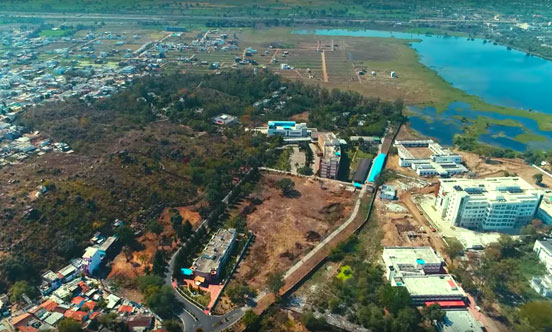
Who we are and what we do?
The ICMR-National Institute of Research in Tribal Health (NIRTH), formerly known as the Regional Medical Research Centre for Tribals (RMRCT), saw the light of the day in three rooms at the adjoining Netaji Subhash Chandra Bose Medical College, Jabalpur, in 1984. The RMRCT was shifted to the main building, spanning a 36-acre lush-green campus in April 2002, and re-designated to its present name (NIRTH) in 2014. The vision of the ICMR-NIRTH is to improve health, nutrition, and educational awareness of tribes through basic, applied, and operational research to levels that they are no longer considered underprivileged communities of the country.
ICMR-NIRTH, since then, has grown to accommodate established laboratories on hemoglobinopathies, molecular genetics, molecular parasitology, genomic epidemiology,
viral diagnosis, microbiology, and in vitro research facilities associated with a modern central animal facility. ICMR-NIRTH produced the baseline data on nutritional disorders,
hemoglobinopathies, common communicable diseases, socio-economic and demographic issues, paving the way for the development and implementation of interventions by the State Health
authorities of Madhya Pradesh and Chhattisgarh. Further, it is constantly striving to identify the Socio-economic, demographic, and cultural profiles of the tribal population, giving
improved insight about the various factors that compound and complicate the magnitude of the problem. The major research areas of ICMR-NIRTH are on Hemoglobinopathies, Malaria,
with a specific focus on tribal populations, Tuberculosis, with a specific focus on the Saharia tribe, Viral diseases of public health importance in central India, and health-related
Social and behavioral practices of the Tribal population.
ICMR-NIRTH is collaborating with the Partner Central TB Division and has an IRL for the diagnosis of multidrug-resistant tuberculosis. ICMR-NIRTH supports NACO in diagnosis,
monitoring, and training of HIV/AIDS. ICMR-NIRTH have demonstrated enormously high prevalence of tuberculosis in Saharia, PVTG in Gwalior and Chambal division. ICMR-NIRTH have
demonstrated the reduction of tuberculosis in Saharia tribe and ICMR-NIRTH is committed to eliminate the tuberculosis in Saharia Tribe. Studies among the tribal population of
M.P, including the Saharia primitive tribe, led to the development of an intensified tuberculosis control program in the state. It also formed the basis for the launch of a project
by GFATM for control of TB in these areas.
ICMR-NIRTH, through its implementation research, has developed and demonstrated a model for effective control of malaria in tribal areas of Dindori, Balaghat, and Mandla district of
Madhya Pradesh. The model on Fluorosis Mitigation through Nutrition supplementation, food diversification and Safe drinking water inducted into the national program.
ICMR-NIRTH has done the micro mapping of Hemoglobinopathies in Madhya Pradesh and Chhattisgarh. Institute steered training and capacity building for sickle cell anemia in 19
tribal dominated states of the country under joint initiative of ICMR and Ministry of Tribal Affairs (MOTA). Recently, in association with Ministry of Health and Family Welfare
and ICMR-NIRTH was involved in formulating training modules, operational guidelines for the National Sickle Cell Anemia Elimination Mission.
Mandate of ICMR-NIRTH
- To plan, conduct and coordinate research in order to bring out the specific health problems and health needs of the tribal of the country.
- To conduct epidemiological studies of communicable and non-communicable diseases among the tribal.
- To investigate haemoglobinopathies in tribal and other communities.
- To advise and assist the Government in planning, executing, monitoring and evaluation of tribal health programs and in training of health functionaries.
The ultimate goal of ICMR-NIRTH is to improve health, nutrition and health awareness among the aboriginals through basic, applied and operational research to a level that they are no longer considered under-privileged in term of health research in the country.
Priority Areas of the Institute
- Saharia Tuberculosis Elimination Project (STEP): Towards End-TB mission.
- DISCUSS - Designing and Implementing Strategies for augmenting Community Understanding and health Service utilisation in Sickle cell disease.
- Deciphering epigenetic determinants of metabolic syndrome in tribes of Madhya Pradesh.
- Development of CRISPR-based point-of-care diagnostics for leprosy and tuberculosis.
- Improving accessibility of the Particularly Vulnerable Tribal groups of Madhya Pradesh to the public health system through the Social Vaccine approach








